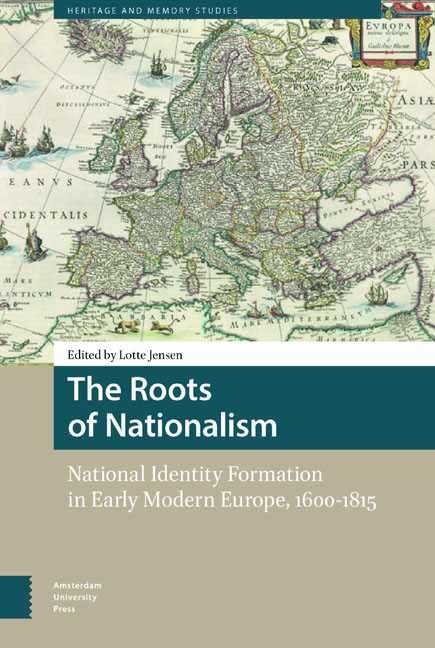Book contents
- Frontmatter
- Contents
- The Roots of Nationalism: Introduction
- Part One The Modernist Paradigm Contested
- Part Two The Genealogy of National Identity
- Part Three Negative Mirror Imaging
- Part Four Maps, Language and Canonisation
- Part Five Nation in the Age of Revolution
- List of Illustrations
- List of Contributors
- Index
8 - Exiled Trojans or the Sons of Gomer: Wales’s Origins in the long Eighteenth Century
Published online by Cambridge University Press: 03 February 2021
- Frontmatter
- Contents
- The Roots of Nationalism: Introduction
- Part One The Modernist Paradigm Contested
- Part Two The Genealogy of National Identity
- Part Three Negative Mirror Imaging
- Part Four Maps, Language and Canonisation
- Part Five Nation in the Age of Revolution
- List of Illustrations
- List of Contributors
- Index
Summary
From December 2007 to March 2014, the National Museum of Wales in Cardiff hosted an exhibition on Wales's origins. Covering a period from the dawn of the ‘homo’ genus to the Middle Ages, the exhibition defined those living within modern political boundaries as Welsh. There was no attempt to construct a monolithic narrative of Welshness, but rather the exhibition linked cultural discontinuities within physical space and common humanity, reflecting a modern multicultural construction of Wales. This was particularly interesting given the exhibition's physical contexts. It was hosted by Wales's oldest national museum which was established in 1907, at a time when several Welsh national institutions were created. Adjacent and roughly contemporaneous to the museum is Cardiff City Hall, which has housed a Pantheon of National Heroes in its Marble Hall since 1916. Among this statuary appear heroes of the primitive Welsh church (St. David), nonconformity (William Williams, Pantycelyn), poetry (Dafydd ap Gwilym), lost independence (Llywelyn Olaf) and indomitable spirit (Owain Glyndŵr). Across from the museum stands a stone circle, constructed in 1899 for a ceremony of the Gorsedd of the Bards in connection with the National Eisteddfod, a revived medieval cultural festival. The Gorsedd, a venerable institution complete with druids, bards and ovates, had originated a century earlier as a late-eighteenth-century cultural invention. Each of these displays signifiers of Welsh nationhood tied to ideas of Wales's origins; origins which very much depended on the perspective from which the Welsh past was viewed, within contemporary values and identities. This process of redefining origins in accordance with changing culture and society can be seen occurring across the long eighteenth century, in a period when Wales underwent a concerted process of reconceptualisation arising from a renewed cultural awareness and new understandings of history and ethnicity.
Anthony D. Smith has discussed the importance of national ‘myths’, either of descent from a notable ancestor or of a ‘golden age’ which exhibits the values of the people, in constructing and maintaining national identity. He further notes that ‘The content of the myths may gradually change, … yet the myths themselves endure and acquire new elements and are subject to continuous elaboration.’
- Type
- Chapter
- Information
- The Roots of NationalismNational Identity Formation in Early Modern Europe, 1600–1815, pp. 167 - 182Publisher: Amsterdam University PressPrint publication year: 2016



